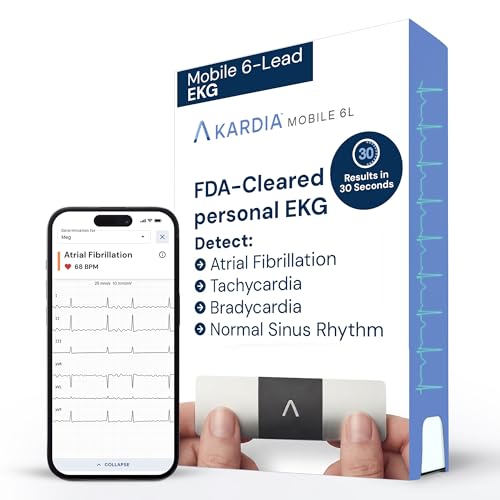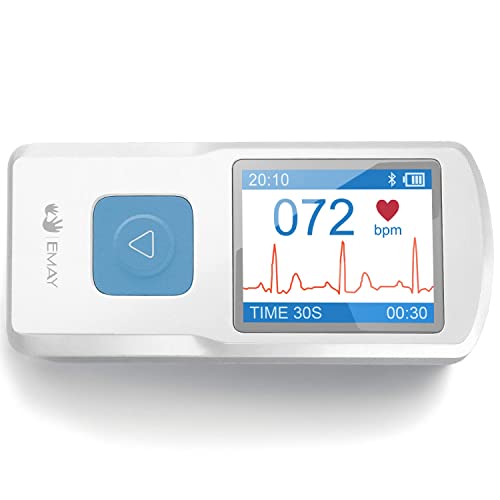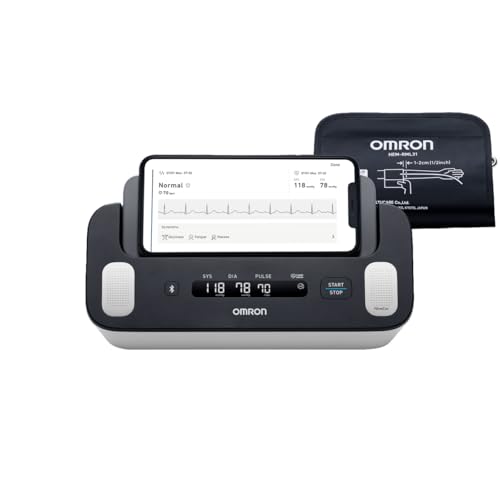In 2025, monitoring your heart health from home is not just a possibility—it’s a reality. With advanced ECG monitors, you can easily track your cardiovascular wellness with features like real-time analysis and smartphone compatibility. These devices empower you to detect arrhythmias and gain valuable insights into your heart’s performance. Curious about which monitors stand out this year? Let’s explore the top options that can help you stay proactive about your heart health.
KardiaMobile 6-Lead Personal EKG Monitor
The KardiaMobile 6-Lead Personal EKG Monitor is perfect for anyone who wants to take charge of their heart health from the comfort of home. This device provides six views of your heart, detecting AFib and irregular arrhythmias in just 30 seconds. It records a medical-grade, six-lead EKG, giving you a detailed insight into your heart activity. Recommended by doctors, it’s the only FDA-cleared six-lead personal EKG monitor available. Plus, it works with most smartphones—just download the Kardia app. Best of all, you don’t need a KardiaCare subscription to get your EKG readings, keeping your costs low.
Best For: Individuals seeking an easy and efficient way to monitor their heart health from home.
Pros:
- Provides six views of the heart, allowing for detailed insight into heart activity.
- Instant results in just 30 seconds, making it quick and convenient.
- No subscription required for EKG readings, keeping costs low.
Cons:
- Does not check for heart attacks, limiting its diagnostic capabilities.
- Requires a compatible smartphone or tablet to use the Kardia app.
- Might not appeal to those who prefer traditional medical evaluations in a clinical setting.
EMAY 6L Portable ECG Monitor
If you’re looking for a user-friendly ECG monitor that fits seamlessly into home health care, the EMAY 6L Portable ECG Monitor stands out with its ability to record ECG signals in six channels. You’ll appreciate its direct connectivity options, allowing you to sync with your PC via USB or your mobile phone through Bluetooth. The included software offers useful features like sample mode and case review, making data management easy. Plus, it’s powered by a rechargeable lithium battery, ensuring long-lasting use. Just remember, it’s for OTC use and not suitable for those with implanted pacemakers.
Best For: Individuals seeking a user-friendly, portable ECG monitor for home health care without the need for subscriptions.
Pros:
- Records ECG signals in six channels for comprehensive heart monitoring.
- Easy connectivity options via USB for PC and Bluetooth for mobile devices.
- Long-lasting performance with a rechargeable lithium battery.
Cons:
- Not suitable for individuals with implanted pacemakers.
- Intended for over-the-counter use only, lacking the precision of hospital diagnostic devices.
- May not provide detailed diagnostic information required for serious heart conditions.
KardiaMobile 1-Lead Personal EKG Monitor
For those who want to monitor their heart health conveniently, the KardiaMobile 1-Lead Personal EKG Monitor is an excellent choice. This compact device captures unlimited medical-grade EKGs in just 30 seconds. By simply placing your fingers on the sensors, you can detect Atrial Fibrillation, Bradycardia, Tachycardia, and Normal Sinus Rhythm. With the Kardia app, you can email your EKGs to doctors or save them on your smartphone. It’s FDA-cleared and the #1 doctor-recommended personal EKG device, making it a reliable option for heart health monitoring. Just remember, it’s not suitable for individuals with pacemakers or ICDs.
Best For: Individuals seeking a convenient and portable solution for monitoring their heart health at home.
Pros:
- FDA-cleared and highly recommended by doctors, ensuring reliability and trustworthiness.
- Captures unlimited medical-grade EKGs in just 30 seconds, providing quick insights into heart health.
- Easy data management with the ability to email EKGs to doctors or save them on smartphones without a subscription.
Cons:
- Not suitable for individuals with pacemakers or ICDs, limiting its use for some patients.
- Requires the download of the Kardia app to function, which may be a barrier for some users.
- Does not detect heart attacks, so it should not be relied upon for emergency situations.
EMAY Portable ECG Monitor
EMAY Portable ECG Monitor stands out as an excellent choice for individuals seeking a reliable, user-friendly device for home health care. This monitor records Lead I ECG signals and displays your heart rate, making it perfect for at-home monitoring. It connects easily to PCs via USB and pairs with mobile phones through Bluetooth, ensuring seamless data transfer. The included software offers features like case uploads and reviews, enhancing your user experience. Powered by a rechargeable lithium battery, it provides long-lasting use. Just remember, it’s not suitable for those with implanted pacemakers. Stay informed about your heart health effortlessly!
Best For: Individuals seeking an easy-to-use, reliable device for monitoring their heart health at home.
Pros:
- User-friendly design for convenient home monitoring of heart rate and ECG signals.
- Seamless connectivity to PCs and mobile phones via USB and Bluetooth for easy data transfer.
- Long-lasting rechargeable battery ensures extended use without frequent recharging.
Cons:
- Not suitable for individuals with implanted pacemakers, limiting its user base.
- Limited to Lead I ECG signals, which may not provide comprehensive heart health insights.
- Over-the-counter device may not replace thorough hospital diagnostic ECG assessments.
KardiaMobile Personal EKG Monitor
The KardiaMobile Personal EKG Monitor stands out as an ideal choice for individuals seeking a portable and user-friendly solution to monitor their heart health. This FDA-cleared device records medical-grade EKGs in just 30 seconds, detecting irregularities like AFib, Bradycardia, and Tachycardia. Simply place your fingers on the sensors, and you’re set! It fits easily in your pocket, and you don’t need a subscription for basic features. You can email your EKGs to your doctor or save them on your smartphone. While some users have concerns about app connectivity and subscription options, its reliability makes it a top choice for heart monitoring.
Best For: Individuals seeking a portable and user-friendly device to monitor their heart health.
Pros:
- Easy to use with quick 30-second EKG recordings.
- Portable design fits easily in a pocket and requires no subscription for basic features.
- Allows users to email EKG results to doctors or save them on their smartphones.
Cons:
- Some users experience frustrations with app connectivity.
- Advanced features require a subscription, which may be a downside for some.
- Reliance on smartphone connectivity could limit usability for certain users.
OMRON Complete 2-in-1 Blood Pressure Monitor + EKG for Home Use
Designed for those seeking an extensive understanding of their heart health, the OMRON Complete 2-in-1 Blood Pressure Monitor + EKG combines essential measurements in one device. Its Advanced Accuracy Technology guarantees reliable blood pressure and EKG readings, helping you track your progress with up to 90 stored readings. The wide-range cuff fits arms 9–17 inches, making it accessible for various users. Plus, it connects to the free OMRON Connect app via Bluetooth, allowing unlimited data tracking and sharing with healthcare providers. While some may face minor app setup issues, this monitor remains a trusted tool for managing your heart health.
Best For: Individuals seeking a comprehensive home monitoring solution for their heart health, including blood pressure and EKG readings.
Pros:
- Advanced Accuracy Technology ensures reliable blood pressure and EKG measurements.
- Bluetooth connectivity with the OMRON Connect app allows unlimited data tracking and easy sharing with healthcare providers.
- Wide-range cuff accommodates a variety of arm sizes (9–17 inches), making it accessible for many users.
Cons:
- Some users may experience minor challenges with app setup and Bluetooth connectivity.
- Certain EKG features require a subscription after a six-month trial, which may be a drawback for some users.
- Excessive body movement detection alerts may cause occasional disruptions in reading accuracy.
KardiaMobile 6L Max Personal EKG Monitor with Subscription
For anyone looking to take charge of their heart health from the comfort of home, the KardiaMobile 6L Max Personal EKG Monitor stands out with its ability to detect six different arrhythmias. This 6-lead device delivers medical-grade EKG results in just 30 seconds. With Bluetooth connectivity, you can easily track and share your data through the Kardia app. The annual subscription includes cardiologist reviews and detailed insights for $99, bundled with the $169 monitor. Users appreciate its accuracy and user-friendly setup, but consider purchasing a protective case for added durability. Remember, it’s not a substitute for emergency medical care.
Best For: Individuals seeking a reliable and convenient way to monitor their heart health and detect arrhythmias at home.
Pros:
- Medical-grade EKG results available in about 30 seconds for timely monitoring.
- User-friendly app allows easy tracking, sharing, and history maintenance of EKGs.
- Cardiologist reviews included in the membership for professional insights into heart health.
Cons:
- Some users report defective units and issues with customer service response.
- Battery replacement can be challenging, making maintenance more difficult.
- Requires a yearly subscription fee in addition to the initial purchase price.
Beurer Cardio Companion EKG Monitor (ME75)
Looking for a reliable way to monitor your heart health at home? The Beurer Cardio Companion EKG Monitor (ME75) is an excellent choice. This portable, FDA-cleared device measures heart rhythms in under 30 seconds using four methods: hand-to-hand, hand to wrist, leg, or chest. Its bright color display gives you real-time results, while alerts notify you of any irregular heart rhythms. Plus, you can track your health with an optional Bluetooth app, saving up to 100 readings locally. With a rechargeable USB battery, this compact monitor is perfect for keeping tabs on your heart health—just avoid it if you have a pacemaker.
Best For: Individuals looking for an easy and efficient way to monitor their heart health at home.
Pros:
- FDA-cleared for accurate heart rhythm measurement in under 30 seconds.
- Portable design with a bright, color display for real-time results.
- Optional Bluetooth app for tracking health data and saving readings.
Cons:
- Not suitable for individuals with pacemakers or metal implants.
- App integration is optional; the device can be used without it.
- Limited to 100 local readings without using the app for unlimited storage.
Portable 12-Lead Heart Monitor with AI Analysis (TH12)
The Portable 12-Lead Heart Monitor with AI Analysis (TH12) stands out as an excellent choice for tech-savvy individuals who want to take charge of their heart health from the comfort of home. Weighing only 62 grams, this compact device continuously monitors your heart for 24 hours, recording 12 leads simultaneously. Its AI analysis identifies 17 categories of abnormalities, providing detailed data that you can share with healthcare professionals. While it’s compatible with Mac and Windows, some users report software issues. If you’re willing to troubleshoot, the TH12 offers valuable insights into your heart health without a subscription fee.
Best For: Tech-savvy individuals looking to monitor their heart health conveniently at home.
Pros:
- Compact and lightweight design for easy portability.
- Continuous 24-hour monitoring with simultaneous 12-lead recording.
- AI analysis identifies 17 categories of abnormalities, providing valuable health insights.
Cons:
- Reports of software functionality issues, particularly on Mac.
- Customer support and software installation difficulties have been highlighted by users.
- Mixed customer ratings indicate variable user experiences and satisfaction levels.
EKG Monitor Device, Personal Heart Rate Monitor with LCD Screen
If you prioritize convenience and real-time heart health monitoring, the EKG Monitor Device with an LCD screen is an ideal choice for you. This portable ECG monitor weighs just 60g and records professional ECG data in only 30 seconds. With multiple monitoring modes—Hand to Hand, Hand to Chest, and Hand to Leg—you’ll achieve higher accuracy. It connects seamlessly to smartphones and computers via Bluetooth, allowing effortless data sharing with family or doctors. Users praise its user-friendly design and instant results, providing peace of mind while tracking heart health. Overall, this device offers great value for personal monitoring.
Best For: Individuals seeking a portable and user-friendly device for real-time heart health monitoring.
Pros:
- Compact and lightweight design makes it easy to carry and use anywhere.
- Provides instant ECG results within 30 seconds, enhancing peace of mind for users.
- Compatible with smartphones and computers for easy data sharing and tracking.
Cons:
- Some users have reported concerns about the accuracy and reliability of readings.
- Mixed reviews on the overall quality, with some users expressing dissatisfaction.
- Initial lack of iOS compatibility may have hindered some potential users.
Factors to Consider When Choosing an Advanced ECG Monitor for Home
When choosing an advanced ECG monitor for home use, you’ll want to focus on several key factors. Device accuracy and reliability are essential, as are the lead configuration and types that suit your needs. Additionally, consider connectivity options, cost structure, and the monitor’s portability and design to guarantee it fits seamlessly into your lifestyle.
Device Accuracy and Reliability
Choosing an advanced ECG monitor for home use hinges on its accuracy and reliability, as these factors directly impact your ability to detect critical heart conditions like arrhythmias. Look for FDA-cleared devices, as this guarantees they’ve passed rigorous testing for safety and accuracy. Monitors with multiple leads, such as six or twelve, provide a more thorough view of your heart activity than single-lead options. Pay attention to user feedback and clinical validation; higher ratings often mean better performance in real-world usage. Additionally, choose a device that alerts you to irregular heart rhythms or changes in your baseline EKG readings, enhancing its reliability as a monitoring tool for your heart health.
Lead Configuration and Types
While selecting an advanced ECG monitor for home use, understanding lead configuration and types is essential for effective heart monitoring. The number of leads impacts the detail of heart activity captured. A 1-lead device offers basic information, but a 6-lead monitor can detect multiple arrhythmias, providing a broader view of your heart health. If you need even more detail, a 12-lead monitor captures readings from various body points, identifying a wider range of abnormalities. Keep in mind that lead placement—like hand-to-hand or hand-to-chest—affects reading accuracy. Consider your health monitoring needs; more leads may require a more complex setup and interpretation, making them better suited for specialized monitoring. Choose wisely to guarantee you get the most effective monitoring for your heart.
Connectivity and Compatibility Features
Understanding lead configuration and types sets the stage for exploring connectivity and compatibility features in advanced ECG monitors. Many of these devices offer Bluetooth connectivity, allowing you to sync data with your smartphone or tablet for easy access and management of your heart health information. It’s important to choose a monitor that’s compatible with multiple operating systems, like iOS and Android, to maximize its functionality through dedicated apps. Some models even let you transfer data to PCs via USB for detailed analysis and storage. Be mindful of whether the device requires a specific app for operation, as some may not work without it. This knowledge will help you make an informed choice when selecting your ECG monitor.
Subscription and Cost Structure
When evaluating advanced ECG monitors for home use, it’s essential to look beyond the initial purchase price and consider the subscription and cost structure associated with these devices. Some monitors require a subscription for access to enhanced features, leading to ongoing costs that can range from about $99 to $169 per year. While some devices offer basic functionalities without a subscription, others reserve thorough features for paying members. You should assess whether the benefits, like cardiologist reviews or detailed health insights, justify the subscription cost. Consider the long-term financial implications of these services, as they can accumulate over time. Making an informed choice here can greatly impact both your budget and heart health management.
Portability and Design Considerations
Choosing the right advanced ECG monitor for home use involves careful consideration of portability and design. You’ll want a device that’s lightweight and compact, making it easy to carry wherever you go. Look for monitors with a rechargeable battery to avoid the hassle of frequent replacements, especially during travel. A bright, clear display is essential for reading results in different lighting conditions, enhancing usability. Additionally, consider monitors that offer multiple monitoring methods, like hand-to-hand or hand-to-chest, providing flexibility in how you take your readings. Finally, verify the ECG monitor includes Bluetooth or USB connectivity options to facilitate seamless data transfer to your smartphone or computer for effective health tracking.
Monitoring and Analysis Capabilities
Portability and thoughtful design set the stage for effective monitoring and analysis capabilities in advanced ECG monitors. These devices can capture multiple leads simultaneously, with some offering up to 12 leads for a thorough analysis of your heart’s activity. Many utilize artificial intelligence for real-time analysis, detecting various abnormalities and enhancing diagnostic capabilities beyond traditional methods. You’ll appreciate receiving instant results, typically within 30 seconds, allowing you to assess your heart health quickly. Compatibility with smartphone apps means you can track trends over time and share results with your healthcare provider. Some monitors even provide additional features like heart rate variability measurement and alerts for irregular rhythms, giving you a holistic view of your cardiovascular health.
User-Friendly Interface and Support
A user-friendly interface is essential for any advanced ECG monitor you consider for home use. It allows you to easily navigate features and access results without needing technical help. Look for monitors that offer mobile app integration, letting you manage data, track trends, and share results with your healthcare provider effortlessly. Clear visual displays and straightforward instructions enhance usability, making it easy for you to understand your heart health readings. Support options like tutorials, FAQs, and customer service are crucial for troubleshooting and maximizing your monitor’s functionality. Additionally, choosing devices that don’t require subscriptions for basic features can simplify your experience and reduce ongoing costs, making them more accessible for home use.








